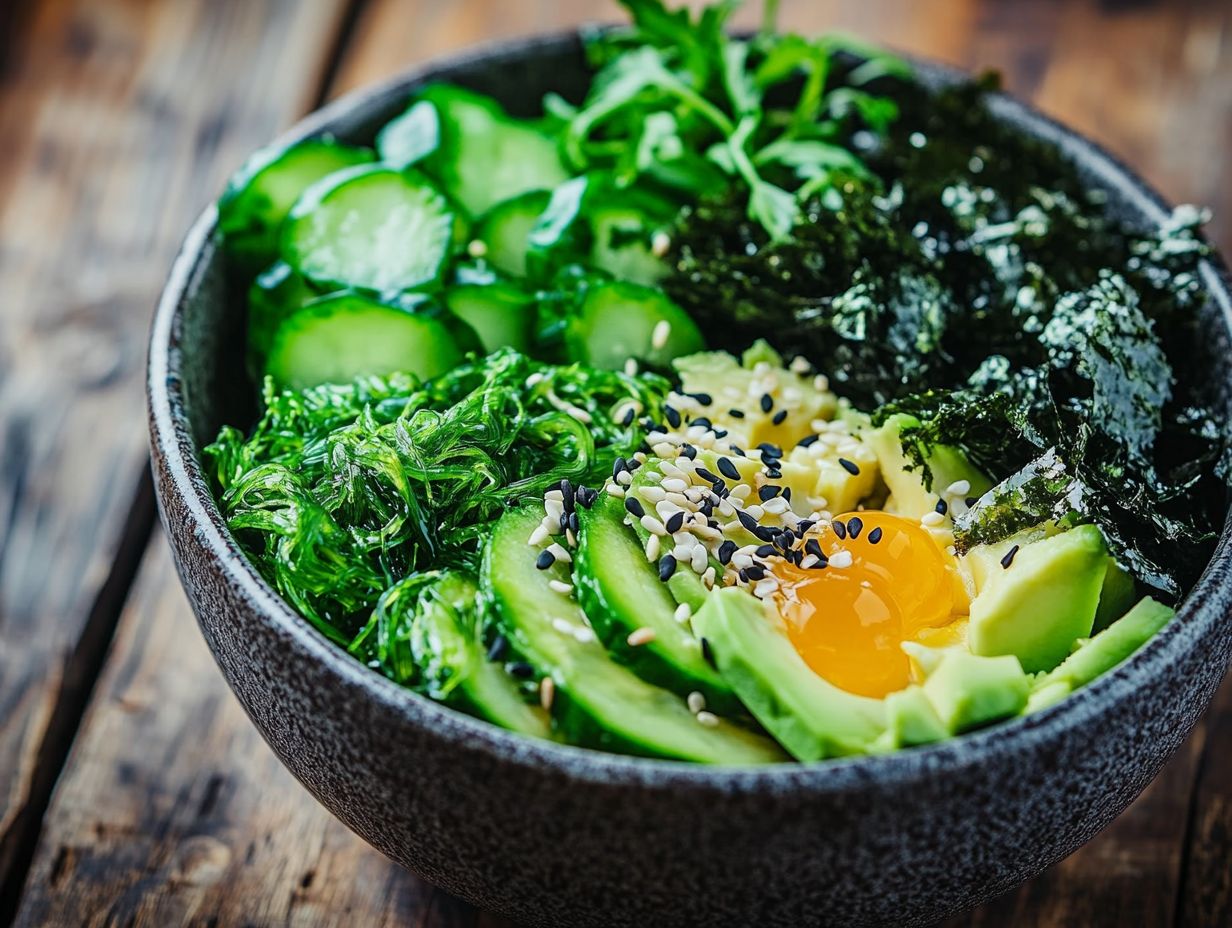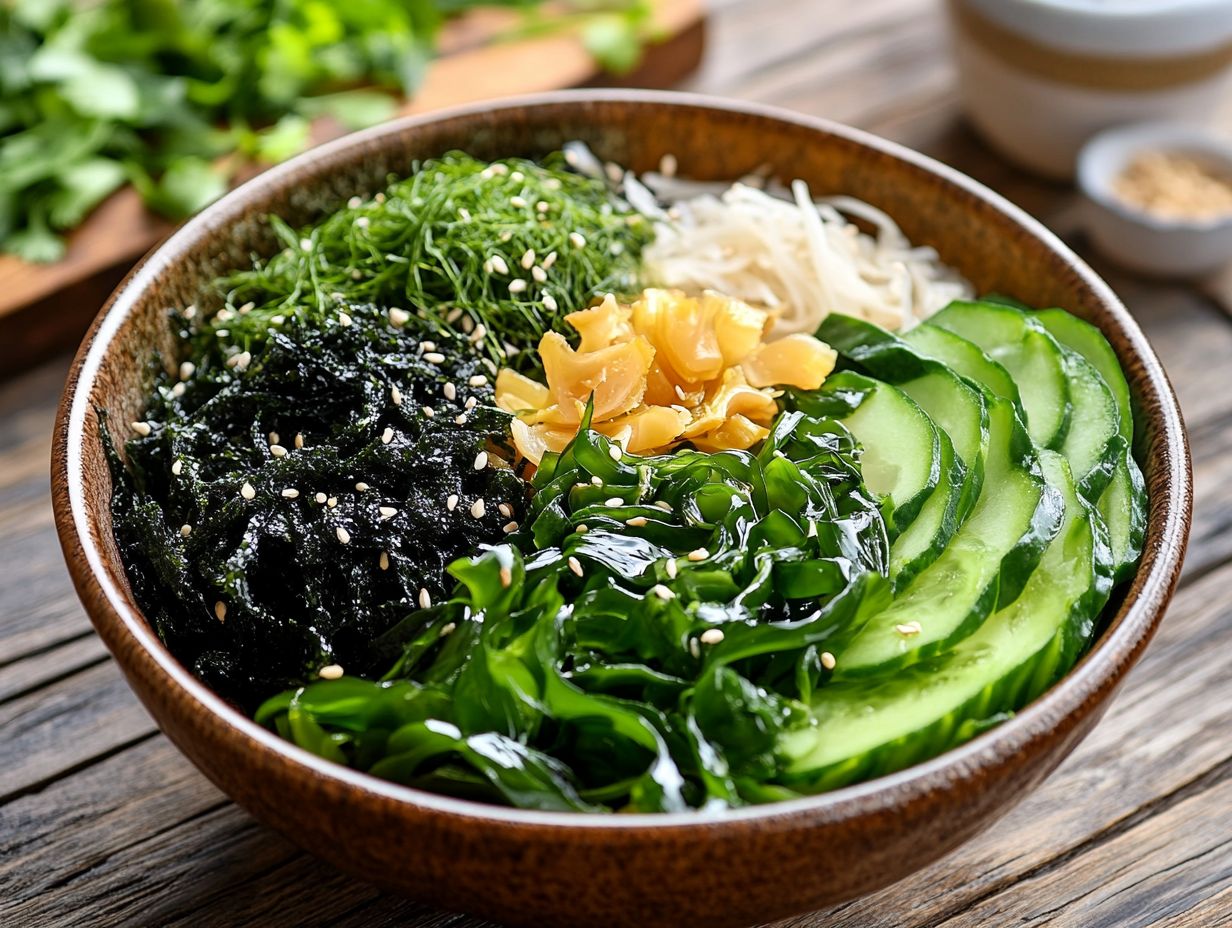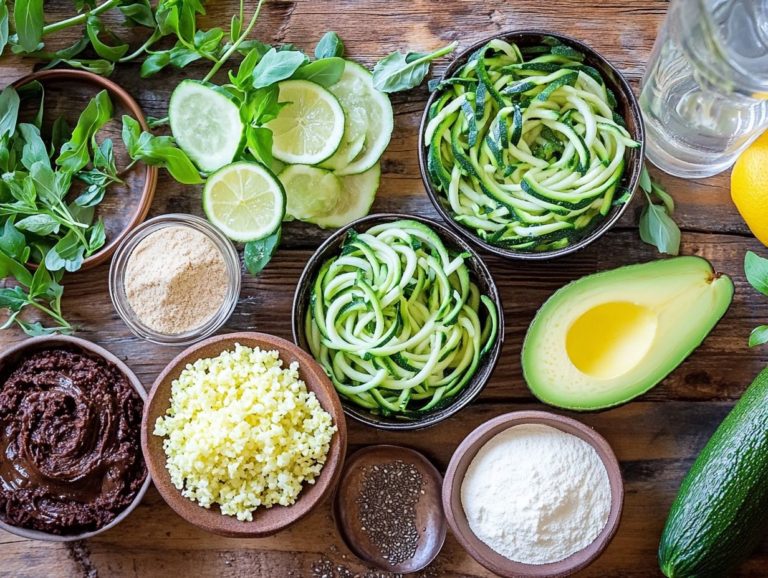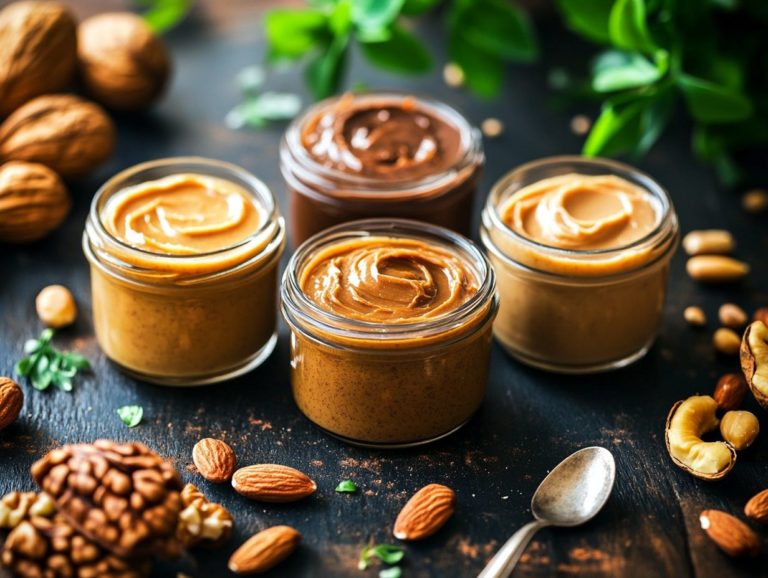How to Incorporate Seaweed into Keto
Contents
- Embracing Seaweed in the Keto Diet
- Key Takeaways:
- What is the Keto Diet?
- What is Seaweed?
- What are the Different Types of Seaweed?
- Why Incorporate Seaweed into Keto?
- How to Choose the Right Seaweed for Keto?
- What to Look for in Seaweed for Keto?
- How to Incorporate Seaweed into Your Keto Diet?
- What are the Benefits of Seaweed in Keto?
- Are There Any Risks or Side Effects of Incorporating Seaweed into Keto?
- Frequently Asked Questions
- Incorporating Seaweed into Your Keto Meals
Embracing Seaweed in the Keto Diet
The keto diet has surged in popularity, celebrated for its ability to assist in weight loss and enhance overall health by embracing a low-carb, high-fat lifestyle. This ketogenic diet promotes a nutrient-rich, healthy body by emphasizing whole foods and minimizing carbohydrates.
Imagine amplifying your keto journey with a remarkable superfood from the ocean. Enter seaweed a nutrient-dense addition that aligns seamlessly with keto principles while offering a plethora of unique health benefits.
This article delves into the essence of the keto diet, the diverse varieties of seaweed such as nori, wakame, dulse, kombu, and bladderwrack and practical ways to weave this versatile ingredient into your meals, all while maximizing its potential advantages.
Discover how seaweed can take your keto journey to the next level!
Key Takeaways:

- Seaweed adds variety and essential nutrients to your keto diet.
- Choose seaweed with low carb and calorie content; avoid those high in added sugars.
- Incorporate seaweed into snacks, salads, sushi, and wraps for delicious meals.
What is the Keto Diet?
The keto diet, also known as the ketogenic diet, is a low-carb dietary plan designed to induce ketosis. Ketosis is when your body burns fat instead of sugar for energy.
This approach emphasizes a rich intake of healthy fats, moderate amounts of protein, and minimal carbohydrates. Embracing this dietary lifestyle can lead to various health benefits, such as effective weight loss, enhanced blood sugar control, and improved gut health due to its high fiber content.
By significantly cutting back on carbohydrates, your body relies on fat as its primary energy source. This shift fosters a healthier you and optimizes your metabolic processes. It can also help regulate blood pressure and support diabetes management.
What is Seaweed?
Seaweed is a remarkable marine plant that has graced plates for centuries, especially in Asian cuisines. Its nutrient profile is impressive, featuring iodine, magnesium, calcium, and vitamins A, C, and K. This versatile ingredient is low in calories and packed with fiber, making it an excellent addition to a variety of dishes, from salads to soups and sushi rolls.
Seaweed is celebrated for its health benefits, particularly its potential to support gut health and thyroid function. Explore the diverse range of seaweed varieties, such as nori, wakame, dulse, kombu, and bladderwrack, each offering unique flavors and textures that can elevate your culinary creations.
Nori is perfect for wrapping sushi, while wakame lends a delightful umami flavor to miso soup. Dulse makes for a tasty snack or a zesty addition to salads. Kombu enhances the richness of bone broth, adding another layer to your keto-friendly recipes. Sea lettuce adds a refreshing crunch to your seaweed salad.
By incorporating seaweed into your meals, you enhance flavors and boost your daily nutrient intake with essential vitamins like vitamin A, vitamin C, and vitamin K. This reinforces its status as a health-promoting food that supports overall wellness.
What are the Different Types of Seaweed?
You ll discover a fascinating array of seaweed varieties. Each boasts its own unique flavors, textures, and nutritional benefits. Take nori, for instance; it s the star of sushi, elevating your dining experience while delivering essential vitamins and minerals that health-conscious diners crave.
Then there’s wakame, often found in comforting miso soup, packed with omega-3 fatty acids that can support heart health. Don t overlook dulse, whose distinct flavor can transform salads and snacks, and kombu, the umami-rich gem that enhances broths and stocks.
Meanwhile, bladderwrack and kelp shine for their high iodine content, promoting thyroid health. Sea lettuce adds a refreshing crunch and a hearty dose of dietary fiber to your meals.
And let s not forget about the superfood sensations, spirulina and chlorella. Not only do they invigorate your smoothies, but they also provide valuable vitamins B12 and E, making them perfect allies for your health regimen. Adding these seaweed varieties to your diet can enhance your culinary experiences and support your health.
Why Incorporate Seaweed into Keto?
Incorporating seaweed into your keto diet can yield remarkable health benefits, thanks to its low-carb nature and rich nutrient profile. This makes it an ideal addition for anyone pursuing a ketogenic lifestyle. Seaweed is a fantastic source of essential nutrients, including iodine, which supports thyroid health.
It s low in calories, allowing you to maintain portion control while enjoying dietary fiber that enhances gut health. This makes it a perfect fit for individuals like you who are keen on optimizing nutrition while sticking to a low-carb meal plan.
Adding seaweed to your meals contributes to a well-rounded nutrient intake, as it is brimming with vitamins and minerals such as vitamin K, calcium, and magnesium. These nutrients work together to promote bone health and support muscle function.
The impressive antioxidant properties of seaweed help combat oxidative stress, which is especially important for those on a keto diet who are often manipulating their metabolism. Seaweed’s high fiber content also aids in portion control and supports gut health.
By integrating seaweed into your diet, you align with low-carb principles while also promoting sustained energy levels and overall well-being. Try adding seaweed to your meals today and enjoy the health benefits!
How to Choose the Right Seaweed for Keto?
Selecting the ideal seaweed for your keto diet requires a keen understanding of its nutritional profile. Ensure it complements your dietary objectives, especially regarding iodine intake and carbohydrate content. Varieties like Irish moss can be excellent additions to your meal plan due to their high nutrient density.
Various types of seaweed, including nori, wakame, and kombu, each present unique health advantages. It’s important to choose them based on their low-carb attributes and nutrient density to maximize the benefits of your ketogenic lifestyle.
What to Look for in Seaweed for Keto?

When you’re on the hunt for seaweed that fits your keto diet, it s essential to seek out options that are low in carbohydrates but high in vital nutrients like iodine and antioxidants. Varieties such as nori, dulse, and sea lettuce stand out, as they enhance your keto-friendly recipes and contribute to a well-rounded dietary plan.
Be sure to scrutinize the nutritional labels to verify the carbohydrate content. Ensure you’re choosing seaweed that has been minimally processed.
Incorporating dried seaweed into your meals think salads, soups, or even smoothies can elevate both flavor and nutrition. For example, wakame is a fantastic choice that s low in calories yet abundant in omega-3 fatty acids.
By blending these types of seaweed into your dishes, you can maintain a balanced keto diet while indulging in a delightful array of flavors and textures. Seaweed salad made with a mix of sea lettuce, wakame, and nori can be a refreshing addition to your meal plan.
What to Avoid in Seaweed for Keto?
When incorporating seaweed into your keto diet, it s crucial to steer clear of varieties that include added food additives or unhealthy fats. These can undermine the health benefits you typically seek from consuming seaweed.
Be diligent about checking the carbohydrate content. Some processed seaweed products may contain higher levels of carbs that simply don t align with the low-carb principles of the ketogenic lifestyle.
As you select your seaweed options, take the time to scrutinize ingredient labels carefully. Many pre-packaged seaweed snacks or supplements can be packed with artificial preservatives, sugars, or unhealthy oils. These detract from the nutritional value of this otherwise beneficial plant-based food. Avoid those with added food additives, as they can undermine the health benefits you’re seeking.
Keeping a keen eye on ingredient lists can help you spot these unwanted additives. Opting for organic, minimally processed seaweed varieties will often lead you to healthier choices. Always prioritize products that emphasize natural ingredients, and be sure to check for any hidden carbs or additives that might not be immediately obvious. This way, every bite you take truly supports your keto lifestyle goals and maintains your blood sugar levels.
How to Incorporate Seaweed into Your Keto Diet?
Dive into the delicious world of seaweed snacks! Incorporating seaweed into your keto diet can be a delightful culinary adventure that effortlessly enriches your meal plan with low-carb ingredients and non-starchy vegetables.
Try crispy seaweed chips or sheets of nori. You can also experiment with kelp in hearty soups and vibrant salads. Seaweed chips with a hint of sriracha can be a perfect addition to your snack list.
The possibilities are limitless, allowing you to explore creative cooking techniques that showcase this nutrient-dense food. You can also incorporate cooking tips to enhance its flavor and texture. Seaweed enhances the flavor of many dishes, making it a versatile staple for anyone committed to a ketogenic lifestyle.
1. As a Snack
Seaweed snacks present a delightful and low-calorie option for your keto diet, offering a satisfying crunch while delivering essential nutrients. Available in various flavors like zesty sriracha or classic sea salt, these snacks create the perfect quick and healthy bite that aligns seamlessly with your low-carb dietary needs.
Their impressive iodine content supports thyroid health, and they often come packed with beneficial minerals such as magnesium and calcium. This further solidifies their status as an ideal keto-friendly snack.
More than just a tasty treat, these snacks effectively curb your cravings for something savory and crunchy without loading you up on carbohydrates essential for maintaining fat-burning. With options like roasted seaweed sheets, seaweed chips, and flavored crisps, you ll find a world of choices waiting for you.
Brands like Annie Chun’s and SeaSnax offer delightful varieties, with flavors ranging from wasabi to sesame. There’s something to tantalize every taste bud!
These snacks allow for guilt-free indulgence while enjoying nutrient-rich whole foods. They also pack in beneficial fiber, making them a smart addition to your keto regimen.
Don’t miss out on these crunchy, low-carb delights that will satisfy your cravings! Start incorporating seaweed into your meals today for incredible health benefits.
2. In Salads and Soups
Incorporating seaweed into your salads and soups is an excellent way to boost the nutritional value of your meals. This helps you stay committed to a ketogenic lifestyle.
Take seaweed salad, for example: it combines a medley of seaweeds like wakame with fresh, non-starchy vegetables. This creates a crunchy, flavorful dish that is low in carbs.
Seaweed is packed with nutrients, including iodine, omega-3 fatty acids, calcium, magnesium, and essential vitamins A, C, and K. It’s a great option for anyone looking to improve their health.
For a tasty appetizer, mix rehydrated nori with diced avocado, cucumber, and sesame oil for a delicious seaweed and avocado salad.
Toss strips of dulse or nori into a vegetable-rich stew to add a unique umami depth. It also introduces antioxidants and beneficial nutrients.
The versatility of seaweed allows it to blend well with various low-carb ingredients and non-starchy vegetables. This ensures each bite is both delicious and nutritious.
3. In Sushi and Poke Bowls
Incorporating seaweed into your sushi rolls and poke bowls is a delightful way to embrace a keto diet while savoring exquisite flavors. Nori, the seaweed used in sushi rolls, introduces a distinctive flavor and texture to your rolls, which can be filled with keto-friendly ingredients like avocado, cucumber, and fatty fish. This ensures low carbohydrate intake, resulting in a truly satisfying meal.
Poke bowls, too, benefit from the addition of seaweed, offering a healthy ingredient that enhances both taste and health benefits.
By blending these ingredients, you can create a beautifully balanced dish that meets your dietary goals and tantalizes your taste buds. The rich flavors of fatty fish such as salmon or tuna harmonize perfectly with the refreshing crunch of cucumber and the creamy texture of avocado.
A sprinkle of sesame seeds can elevate your culinary experience even further.
Fresh ingredients offer amazing health benefits that you can t ignore; they re generally lower in carbs and abundant in essential vitamins and minerals. Seaweed, in particular, stands out as a fantastic source of iodine and antioxidants, supporting overall health while delivering a unique umami flavor that pairs beautifully with various fillings.
Each bite becomes a delightful fusion of taste and nutrition, making your meal both indulgent and beneficial.
4. In Keto-friendly Wraps and Rolls with Seaweed

Using seaweed to craft keto-friendly wraps and rolls is a brilliant strategy that slashes carbs and enriches your diet with a bounty of nutrients. Picture this: kelp and nori wrapping up flavorful fillings like grilled shrimp, non-starchy vegetables, and healthy fats, creating a low-calorie yet nutrient-packed option.
This culinary approach encourages you to control portions while indulging in a medley of flavors and textures.
The versatility of various seaweeds introduces an exhilarating flair to your meal preparation. For example, dulse offers a subtly smoky flavor that pairs exquisitely with avocado and cream cheese, forming a delightful roll rich in flavor and texture.
Alternatively, blending wakame into a salmon and cucumber mix can elevate your dish to a fresh and crunchy delight.
As you explore in the kitchen, remember to rinse the seaweed thoroughly to eliminate excess salt. Adding a drizzle of sesame oil can provide a touch of richness.
These wraps align beautifully with your keto macronutrient goals and ensure appropriate iodine intake, contributing to your overall health and well-being.
5. As a Seasoning or Garnish
Utilizing seaweed as a seasoning or garnish can truly elevate the flavor and texture of your keto dishes, imparting that unique umami taste that enhances your culinary experience. Imagine sprinkling dried seaweed flakes or powders over salads, vegetable dishes, or proteins it’s a simple way to provide a nutritious boost and an appealing visual element. This method adds depth of flavor and introduces beneficial nutrients into your meals.
Varieties like nori, wakame, and dulse stand out as popular choices, each offering distinct flavors and textures. Nori is perfect for sushi rolls or as a crunchy topping for soups. Rehydrated wakame adds a refreshing touch to seaweed salads. Dulse, with its slightly smoky flavor, makes an excellent garnish for eggs or avocado dishes.
Incorporating these seaweed varieties into your cooking not only adds a twist to your meals but also allows you to enjoy their rich nutrient profile packed with vitamins, minerals, and antioxidants all while staying true to your keto-friendly practices and whole foods.
What are the Benefits of Seaweed in Keto?
Nutrient Density
Add seaweed to your keto diet for amazing benefits, including enhancing gut health and offering a rich source of essential nutrients all while keeping your carbohydrate intake in check.
Seaweed brims with vitamins and minerals, including iodine, magnesium, and antioxidants, making it an exceptional choice for anyone embracing a ketogenic lifestyle.
Digestive Benefits
Its high fiber content supports digestive health and helps maintain a healthy body, aligning with your weight loss goals.
1. Rich in Nutrients
Seaweed is a powerhouse of nutrition, loaded with an impressive array of vitamins, minerals, and antioxidants that can enhance your keto diet. This low-calorie superfood contains essential nutrients like iodine, calcium, magnesium, and vitamins A, C, and K, contributing to your overall health and well-being. Adding seaweed to your meals helps you meet your dietary needs while supporting metabolic processes.
Iodine is vital for thyroid function, regulating metabolism and energy levels crucial for those on a weight management journey. Calcium and magnesium support muscle function and help prevent cramps, a common hurdle for those following a ketogenic lifestyle. The antioxidants present in this marine marvel can reduce inflammation and bolster your immune system, all while regulating blood pressure, aligning perfectly with the principles of a nutrient-rich, low-carb diet.
By adding seaweed to your salads, soups, or snacks, you elevate flavor and enrich your diet with essential nutrients, making each meal a step towards optimal health.
2. Low in Carbs and Calories, Perfect for Keto
One standout attribute of seaweed is its low-carb and low-calorie nature, making it an ideal food choice for anyone following a keto diet. With minimal carbohydrates per serving, seaweed allows for effective portion control while providing essential nutrients and fiber, perfect for various recipes that align with a low-carb lifestyle.
This versatile ingredient fits into multiple low-carb recipes, such as kelp noodles tossed in a rich sesame dressing or refreshing seaweed salads that serve as delightful starters or side dishes. Incorporating seaweed into your meal planning enriches flavors and keeps calorie counts low crucial for anyone looking to trim excess weight and manage diabetes.
Using seaweed as a wrap for protein-rich fillings enhances satiety without compromising your ketogenic principles. This ocean-based superfood, including varieties like sea lettuce, bladderwrack, Irish moss, spirulina, and chlorella, offers a unique opportunity to diversify your meals while staying true to a low-carbohydrate approach and aiding in portion control.
3. May Aid in Weight Loss
Incorporating seaweed into your keto diet can significantly aid in weight loss, thanks to its impressive fiber content and nutrient density. This powerhouse ingredient helps promote satiety the feeling of fullness meaning you may naturally reduce your overall calorie intake.
The fiber in seaweed plays a vital role in maintaining gut health, supporting digestion, and providing that satisfying feeling of fullness. This makes it easier for you to manage your weight while embracing a low-carb lifestyle.
The unique composition of seaweed enhances nutrient absorption and helps regulate cholesterol levels while improving gut health. This blend supports a balanced gut microbiome and helps you resist cravings for high-calorie snacks. The probiotics and prebiotics found in seaweed work to optimize your digestive health, further aiding your weight loss efforts with keto-friendly recipes and cooking tips.
By adding seaweed to your meals or enjoying it as a snack, you can take charge of your appetite while staying true to your dietary goals. This sustainable approach effectively supports your weight loss journey, allowing you to thrive on your keto path.
4. May Improve Heart Health

Seaweed holds remarkable potential for enhancing heart health, thanks to its rich antioxidant profile and beneficial fatty acids that support cardiovascular wellness. When you incorporate it into a keto diet, the nutrients found in seaweed can help you manage blood pressure and cholesterol levels, paving the way for a healthier heart and reducing the risk of heart disease.
Packed with essential vitamins and minerals like vitamin K, magnesium, and omega-3 fatty acids, seaweed plays a critical role in maintaining optimal heart function. The antioxidants within it work diligently to combat oxidative stress, a significant contributor to cardiovascular issues.
For those embracing a keto lifestyle, adding seaweed not only brings a delightful twist to your meals but also boosts your nutrient intake without compromising your carb limits. Its fibrous texture may even aid in digestive health, making seaweed a versatile and valuable addition to your heart-healthy culinary repertoire.
Are There Any Risks or Side Effects of Incorporating Seaweed into Keto?
Incorporating seaweed into your keto diet can be a fantastic way to reap numerous health benefits, but it’s crucial to remain mindful of the potential risks and side effects that come with its consumption. One significant concern is iodine intake from seaweed. When consumed in excess, it can lead to thyroid health issues and various complications. Striking a balance in your seaweed consumption is essential, as it allows you to enjoy its benefits without inviting adverse effects based on your individual health conditions.
Excessive iodine can worsen conditions like hyperthyroidism or hypothyroidism, resulting in symptoms such as fatigue, weight gain, or irregular heartbeats. If you have pre-existing thyroid issues, it’s wise to consult with a healthcare provider before incorporating seaweed into your meals.
To safely include this nutrient-rich food in your keto diet, moderation is key. Begin with small amounts, like a couple of sheets of nori or a light sprinkle of dulse flakes, and gradually increase as your body adapts. By pairing seaweed with a diverse diet, you’ll ensure a balanced nutrient intake while minimizing any potential risks.
Frequently Asked Questions
How to Incorporate Seaweed into Keto?
Incorporating seaweed into a keto diet is simple! Try these tips to get started:
What types of seaweed are keto-friendly?
Seaweed is naturally low in carbohydrates, making it a great option for those on a keto diet. Some keto-friendly seaweed options include kelp, nori, and dulse.
Can I eat seaweed on a keto diet?
Yes, you can definitely eat seaweed on a keto diet! Seaweed is a great source of essential vitamins and minerals, and it’s also low in carbs and high in fiber.
Incorporating Seaweed into Your Keto Meals
How can I incorporate seaweed into my keto meals?
There are many exciting ways to incorporate seaweed into your keto meals! Use it as a wrap for sushi or a topping for salads and soups. Try making keto-friendly seaweed snacks by roasting or drying them out!
Are there any risks to incorporating seaweed into a keto diet?
While seaweed is generally safe to eat, be mindful of how much you eat. Seaweed is high in iodine, so consuming large amounts can potentially lead to an excess of this mineral. Enjoy seaweed in moderation to maximize its benefits! If you have any concerns, consult with a healthcare professional.
Can I use seaweed as a replacement for other carb-heavy ingredients on keto?
Absolutely! Seaweed can also replace noodles in dishes like pad thai or spaghetti. You can even use it as a low-carb alternative to bread or tortillas. Get creative and experiment with different ways to use seaweed in your keto cooking!
Why not try seaweed in your next dish? You’ll love the flavors it adds!






